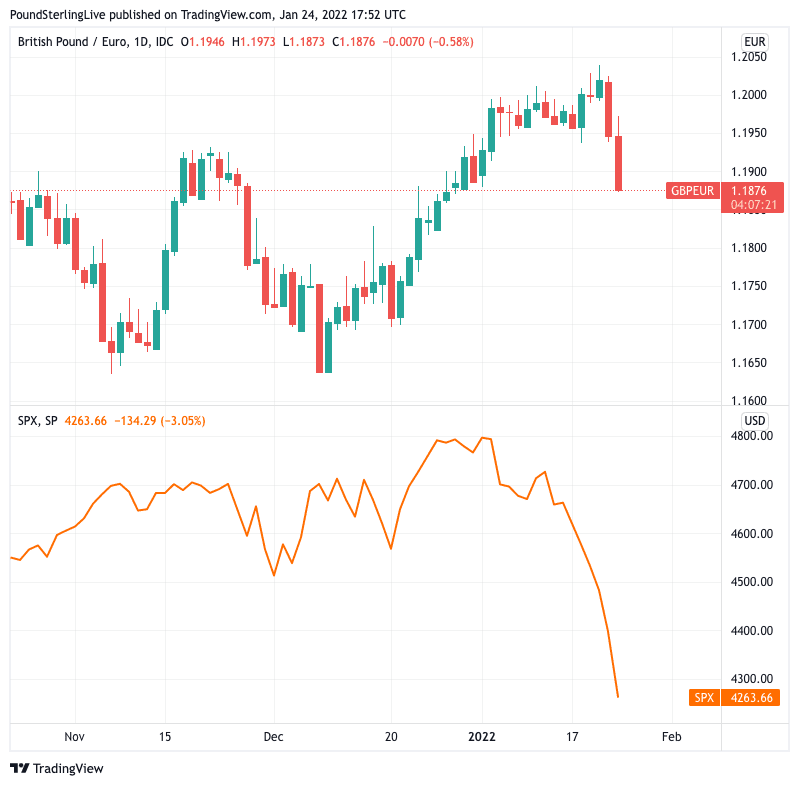Pound Sterling Toils Under Heavy Markets
- Written by: Gary Howes
- Markets in the red again
- GBP suffers vs. EUR, USD
- But gains on AUD, NZD and ZAR
- Ukraine a source of geopolitical anxiety
- Markets nervous ahead of midweek Fed meet

Image © Adobe Stock
Another risk-off session means the British Pound is falling against the Euro, Dollar, Franc and Yen but is rising against the Australian Dollar, New Zealand Dollar and Emerging Market currencies.
Foreign exchange markets have adopted a 'risk-on / risk-off' mindset amidst an ongoing global stock market sell-off, thanks to a combination of fears relating to higher future Federal Reserve interest rates and an impending Russian invasion of Ukraine.
"Riskier assets are on the backfoot as investors seek safer bets in traditional haven spots like the Japanese yen and gold which is currently near 2-month highs. As well as Fed fears, the rising tensions in Ukraine and mounting concerns about a Russian invasion are adding to the ‘risk off’ mood," says George Vessey, Currency Strategist at Western Union.
The Pound to Euro exchange rate has extended Friday's sharp fall into the new week and is now back at 1.1892, meaning the two-year highs just above 1.20 reached last week are fading into a memory.
The Dollar - a favourite in times of market nervousness - is being bid, pushing the Pound to Dollar exchange rate back to 1.3452 in the process.
Above: GBP/EUR is lead lower by deteriorating risk sentiment, as embodied by the decline in the S&P 500.
Ukraine-Russia tensions are high, with Western countries warning citizens an invasion is close and could happen at anytime.
The UK joined the U.S. and announced Monday it would be pulling some staff from its Kyiv embassy in recognition of rising fears.
Russia has nevertheless denied plans for military action, although tens of thousands of troops have amassed on the border.
"The threat of conflict breaking out on the doorstep is hanging over European indices, as hopes begin to fade that there will be fresh meaningful moves from diplomats," says Susannah Streeter, Senior Investment and Markets Analyst at Hargreaves Lansdown.
Secure a retail exchange rate that is between 3-5% stronger than offered by leading banks, learn more.
Looking ahead, another big risk for markets and the Pound lies ahead in the form of Wednesday's Federal Reserve announcement.
The Fed is tipped to deliver a clear communication that interest rates will rise in March.
But, it is the guidance as to further interest rates and quantitative tightening - the process whereby quantitative easing is reversed - that will matter for markets.
"While markets are already 100% priced for a 25bp rate hike in March and penciling in 4 hikes in 2022, we think balance sheet runoff still needs to be priced in. Any hints surrounding runoff coming sooner and faster than the market currently expects are likely to continue pushing real rates higher," says strategist Mark McCormick at TD Securities.
Any further shock with regards to future tight monetary conditions in the world's largest economy could mean market sentiment suffers further.
If this is the case, then the British Pound is looking at a dour week of trading.
{wbamp-hide start}
{wbamp-hide end}{wbamp-show start}{wbamp-show end}
"Here we are, and markets have started to price in four rate hikes for the US and a first hike in the eurozone this year," says Christian Gattiker, an economist at Julius Baer.
"So in no time, the mood in financial markets has shifted from being jubilant to one of despair. The S&P 500, the poster child of the raging equity bull, has broken below its 200-day moving average. This is bad. A lot of damage has been done to the charts, and it will take time to heal," adds Gattiker.
But taking a step back and adopting a 'bigger picture' approach is Mark Haefele, Chief Investment Officer, UBS Global Wealth Management.
Haefele says although a number of critical market factors still in flux, for longer-term investors," we don’t think it is a bad thing if market volatility takes some of the air out of the more speculative corners of the market".
"Nor is it a bad thing if current volatility means that some secular growth names are being offered at their best prices in months," he adds.
UBS says we remain in a very strong economic growth environment, which should stay supportive of cyclical and value sectors in the short term.
As such, the British Pound could merely be witnessing a near-term dip ahead of a return higher in keeping with a more dominant longer-term uptrend.






